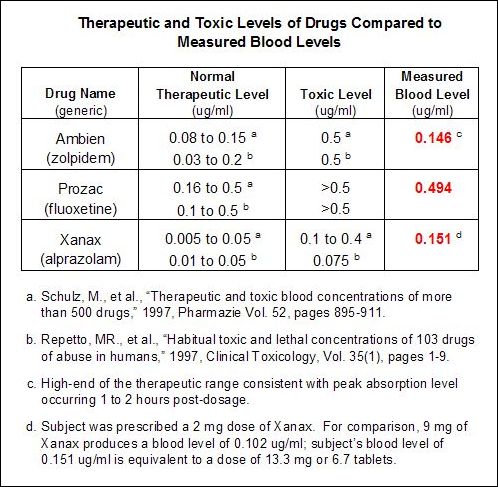William R. Sawyer, Ph.D., Toxicologist
- Diplomate, American Board of Forensic Medicine
- Diplomate, American Board of Forensic Examiners
|
| About Us
TCAS, LLC, provides a wide range of professional services including review of chemical, alcohol, pharmaceutical or radiological exposures within civil and criminal litigation matters. Dr. Sawyer has considerable expertise in matters pertaining to alcohol intoxication assessment, intentional poisoning homicides, occupational and community exposures to carcinogens, medical malpractice involving pharmaceuticals, pyrolysis products, heavy metals, organic chemicals, dioxins and drugs of abuse. Forensic toxicology and toxic exposure investigations include analytical protocol and referral of autopsy material for analyses. Environmental and occupational health risk assessments include site-specific assessments, dose measurement and causation determination. Final work products include scientific method references, method validation, forensic chain-of-custody and written reports. Reports and expert witness testimony have been provided to multiple clients in over 30 states.
|
| Please Note
We routinely work throughout North America from the Virgin Islands and the Bahamas to Alaska in addition to providing expert international testimony as far away as Hong Kong. We have offices in the states of New York and Florida.
|
| Contact Us
Toxicology Consultants & Assessment Specialists, LLC
6450 Pine Avenue
Sanibel, Florida 33957
29 Fennell Street
Skaneateles, New York 13152
FL: 239-472-2436
NY: 315-685-2345
Toll free (U.S. & Canada):
800-308-0080
|
|
American Board of
Forensic Medicine
|
|
Issue No. 9
Welcome to the latest edition in our new series of short, educational summaries of forensic toxicology matters taken from actual TCAS, LLC cases over the past 30 years. Each case summary is factual, although identifying case information has been removed unless revealed through jury verdict reports. While interesting to read, the purpose of these case summaries is to show how the application of toxicological principles can be used in forensic matters. On occasion, we will also be releasing summaries on new toxicological studies and regulations.
TCAS, LLC is sending this newsletter to all our past and present clients with the hope that it is of value in their professional endeavors.
In the event you have an interesting case you would like to discuss, please feel free to call or email us for a prompt, confidential teleconference.
Sincerely,
Dr. Sawyer
|
|
_______________________________
|
|
Polypharmacology Induces "Sleep Driving"
This case study illustrates the role of toxicological weight-of-evidence (WOE) in a motor vehicle accident case involving antidepressants. It also illustrates how drug interactions can be considered evidential in a toxicological causation assessment.
On the evening prior to a serious motor vehicle accident, a woman failed to stop at a red light. She was given a citation by a police officer and then escorted home. The woman ingested Xanax and Ambien just before bed. Upon experiencing difficulty breathing the next morning, she called her physician and was told to come in right away. After dressing, she then ingested a dose of Prozac. While driving to the physician's office, she ran a stop sign and collided with another vehicle.  The police officer who arrived at the accident scene suspected a possible drug influence when he saw her taking medicine bottles from her purse and noticed other bottles of medication on the seat. When questioned, the woman did not seem to recognize where she was or what was happening. After transport to the hospital for treatment, the woman was released. She returned an hour later and remained for two days for treatment of asthmatic complications. The driver of the other vehicle subsequently filed a personal injury lawsuit. Dr Sawyer was retained to conduct an objective toxicological assessment. Pharmaceutical Exposure Assessment
Dr. Sawyer reviewed the police reports, the woman's deposition testimony and her medical history, which noted that the woman was being treated for depression and anxiety. She had also been diagnosed with asthma, fibromyalgia, anemia, and hypertension. The records revealed that the woman had a history of losing consciousness due to her asthma.
Dr. Sawyer performed a thorough review of the various pharmaceuticals that had been prescribed. Meanwhile, the forensic toxicology laboratory had conducted an independent analysis of her blood taken just after the accident. From this, Dr. Sawyer assembled a table comparing the reported blood levels with the therapeutic and toxic levels for each substance detected in the lab report: 
Adverse Effects of Antidepressants
Dr. Sawyer noted in his clinical toxicology analyses that the three prescription neuroleptic pharmaceuticals detected in the lab report posed significant, well-established toxicological effects and documented interaction issues. As several of the drugs had been administered for similar purposes, their presence encompassed the realm of polypharmacology, which is defined as "the treatment of diseases by modulating more than one target." Polypharmacology can encompass both one drug binding to multiple targets and multiple drugs binding to different targets. Dr. Sawyer noted the following points for each medication:
Ambien (zolpidem)1- Side effects include drowsiness, dizziness, diarrhea and a "drugged feeling." Central nervous system effects include impairment of alertness and motor coordination.The pharmaceutical company cautions that Ambien should not be taken with other medicines that can cause drowsiness.
- Abnormal thinking, behaviorial changes and complex behaviors such as "sleep driving" (i.e. driving while not fully awake after ingestion of a sedative-hypnotic with amnesia for the event) have been reported with Ambien.
- The FDA/manufacturer's package insert cautioned that potential impairment may occur the day following ingestion of Ambien.
Prozac (fluoxetine)2- Potential for cognitive and motor impairment has been reported. Prozac has the potential to impair judgment, thinking and motor skills. Caution is advised when operating machinery including motor vehicles (generally includes warnings and follow-up by the prescribing physician to be certain the patient is tolerating the medication without significant side effects).
- Drug interactions: Co-administration with Xanax (alprazolam) has resulted in increased alprazolam plasma concentrations and further psychomotor performance decrements due to increased alprazolam levels.
- Other adverse effects of the central nervous system; e.g. insomnia, nervousness, anxiety, somnolence, dizziness, tremor, abnormal thinking.
Xanax (alprazolam)- Adverse effects of the central nervous system include drowsiness, light-headedness, confusion, nervousness, and dizziness. Because this drug may cause dizziness or drowsiness, users should not drive or operate machinery or engage in any activity requiring alertness (generally requires tolerance and follow-up by the prescribing physician to be certain the patient is tolerating the medication without significant side effects).
- Serious side effects include unusual risk-taking behavior, decreased inhibitions, no fear of danger, feeling light-headed, and fainting.
- Co-administration of Prozac with Xanax is contraindicated due to potentiated increase of maximum alprazolam plasma concentration.
- Benzodiazepines (including Xanax) produce additive effects to the central nervous system when co-administered with other drugs which produce central nervous system depression.
Summary of Results
Dr. Sawyer applied a weight-of-evidence  (WOE) methodology to the exposure factors. By charting a timeline with respect to measured blood levels, and using deposition testimony and the therapeutic and toxic blood concentrations documented in the peer-reviewed toxicological literature, he identified specific and predictable polypharmacological effects: - At 0.151 ug/ml, the Xanax blood level was clearly in the toxic range. This high level was achieved, in part, through drug interaction producing an equivalent Xanax ingestion of 13.3 mg (approximately 6.7 tablets) resulting in substantial impairment.
- The Prozac blood level was at the extreme end of the therapeutic range at 0.494 ug/ml. Prozac is also known to increase the toxicity of Xanax. Calculations showed that the Prozac/Xanax interaction increased the maximum plasma concentration by 46%, decreased clearance by 21% and increased half-life by 17%. The symptomatic result of this enhancement effect was significantly decreased psychomotor performance.
- The Ambien blood level was also at the extreme end of the therapeutic range at 0.146 ug/ml and is consistent with dosage 1 to 2 hours prior to the accident. Ambien is known to induce "sleep driving" and (like Prozac) can increase the toxicity of Xanax.
Outcome
Dr. Sawyer was able to present compelling evidence with reasonable toxicological certainty that the self-administered doses, the times at which they were taken, and the additive effects of the pharmaceutical interactions substantially contributed to predictable impairment at the time of the accident. His report was subsequently instrumental in a rapid settlement favorable to the Plaintiff.
| Notes and References | | 1 | Adverse effects per "2011 Physicians' Desk Reference," Edition 65, pages 2924-2929 | | 2 | Adverse effects per "2011 Physicians' Desk Reference," Edition 65, pages 1816-1827 | | 3 | "Baselt, RC, "Disposition of toxic drugs and chemicals in man," 6th edition, Biomedical Publications, page 33. |
(Disclaimer: Toxicology case studies are impartial and objective summaries of toxicological matters in which TCAS was retained for the purpose of assessing health-based factors which, in some cases, led to a determination of causation. No names or identifying information have been provided due to privacy and legal considerations. In the above matter, Dr. Sawyer was retained by the plaintiff.)
|
|
Meet the Firm
 Dr. William Sawyer Dr. William Sawyer is a professional toxicologist with a doctorate in toxicology from Indiana University School of Medicine. He is a diplomate of the American Board of Forensic Medicine and has more than 30 years of extensive experience in public health and forensic toxicology with specialized expertise in causation analyses (for plaintiff and defense) involving alcohol, drugs-of-abuse, pharmaceuticals, herbal products, dioxins, solvents, heavy metals, crude oil, radionuclides/NORM and other substances. Dr. Sawyer has testified at trial and/or deposition in more than 30 states including NY, MA, CT, PA, RI, NH, DE, NJ, WV, VA, NC, SC, GA, FL, AL, MS, LA, AR, MO, KY, IN, IL, WI, MI, OH, MN, MT, WA, CA, TX and OK. Additionally, he has provided international expert testimony as far away as Hong Kong.
As a skilled scientist and communicator in the area of toxic tort, Dr. Sawyer provides services to governmental agencies, corporations and select plaintiffs or defendants. Dr. Sawyer currently serves as the Chief Toxicologist forTCAS, LLC, and also has been an Assistant Professor (adjunct) for 23 years with the Department of Medicine, Upstate Medical University, Syracuse, New York. Dr. Sawyer has approximately 14 years experience as a licensed clinical and environmental laboratory director in several states.
Dr. Sawyer is a distance swimmer for the Gulf Coast Swim Team and recently completed the "Swim Around Key West" race in just under six hours. He is also a triathlete with the distinction of being a four-time Ironman. He loves to fish and SCUBA dive in northern New York State and the Gulf of Mexico.
 Jennifer Clark (Jen) began working with Dr. Sawyer in 2007 after spending the previous 18 years as a full-time mom. With a background as a legal assistant prior to the birth of her two daughters, Jen spends a considerable amount of her time performing research for active TCAS, LLC, cases. Not only does she have a special ability to ferret out information, she also has excellent grammatical skills which she applies to communications and report preparation. Jen loves a challenge and the fact that no two days at TCAS, LLC, are the same! Jennifer Clark (Jen) began working with Dr. Sawyer in 2007 after spending the previous 18 years as a full-time mom. With a background as a legal assistant prior to the birth of her two daughters, Jen spends a considerable amount of her time performing research for active TCAS, LLC, cases. Not only does she have a special ability to ferret out information, she also has excellent grammatical skills which she applies to communications and report preparation. Jen loves a challenge and the fact that no two days at TCAS, LLC, are the same!
When not being an honorary toxicology investigator, Jen enjoys gardening, camping, reading and solving jigsaw puzzles. She is also a huge fan of the Adirondack Mountains of upstate New York and spends several weeks each summer exploring the woods and lakes with her husband, Jim, and golden retriever, Gracie.
Funmi Afelumo began working  with Dr. Sawyer in March 2015. He recently graduated from the State University of New York - College of Environmental Sciences and Forestry (SUNY-ESF) with his master's degree which focused on Plant Science and Biotechnology. His graduate research project was in the field of phytoremediation - specifically increasing plant tolerance to toxic heavy metal exposure. He has been performing research in the field of phytoremediation and environmental health and safety since 2010. He has presented his research at several conferences including those for environmental health and biotechnology.
Funmi particularly enjoys that at TCAS he gets to use scientific knowledge and reasoning to help solve problems and make society better. When not reading scientific journals and other literature, Funmi enjoys hiking through New York's beautiful state parks and volunteering.
 Carol Sawyer serves as the bookkeeper for TCAS, LLC. By training, she is a dental hygienist and graduate from Indiana University School of Dentistry. She also has prior training and work experience in an accounting firm as a file room clerk and has managed TCAS, LLC's records since its inception in 1989. Carol enjoys preparing specialty foods, volunteering in her church and community, visiting barrier island beaches, reading and just being outdoors. Carol Sawyer serves as the bookkeeper for TCAS, LLC. By training, she is a dental hygienist and graduate from Indiana University School of Dentistry. She also has prior training and work experience in an accounting firm as a file room clerk and has managed TCAS, LLC's records since its inception in 1989. Carol enjoys preparing specialty foods, volunteering in her church and community, visiting barrier island beaches, reading and just being outdoors.
Support Staff |
|